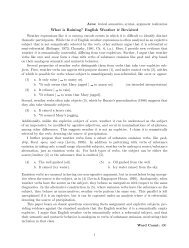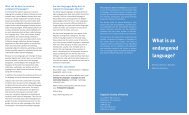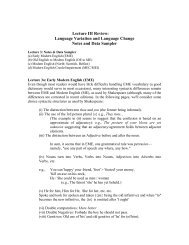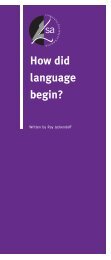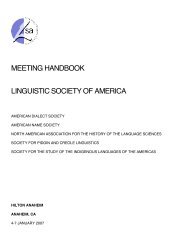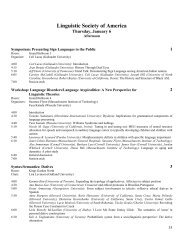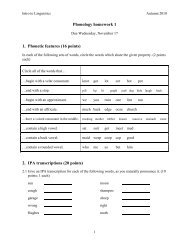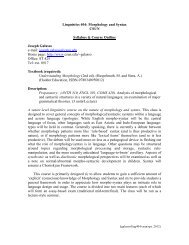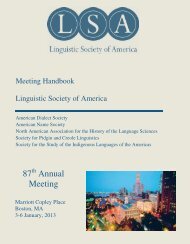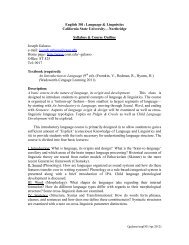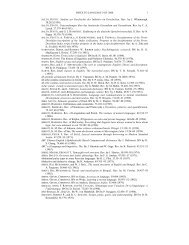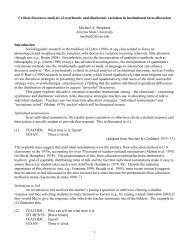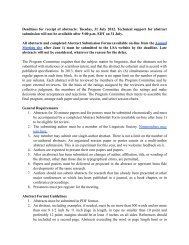here - Linguistic Society of America
here - Linguistic Society of America
here - Linguistic Society of America
You also want an ePaper? Increase the reach of your titles
YUMPU automatically turns print PDFs into web optimized ePapers that Google loves.
LSAFriday EveningProgram Committee Report2013 Annual MeetingScott SchwenterThis year, the Program Committee (PC) oversaw the evaluation and selection <strong>of</strong> the abstracts submitted to the Annual Meeting.We received a total <strong>of</strong> 699 submissions, which were divided into three distinct types (as determined by the submitters): ‘20-min’(to be considered only as a 20 minute paper presentation), ‘20-min OR poster’ (to be considered as a paper, and then as a poster ifnot accepted as a paper), and ‘poster’ (to be considered as a poster only). The breakdown <strong>of</strong> submissions for this year appears inTable 1, with totals from recent years included for comparison.Table 1: Poster and paper submission and acceptance 2002-2013(15-min. and 30-min paper categories for years 2002-2005 are collapsed.)Posters Papers TotalYear City subm 1 acc % subm 2 acc % subm acc %2013 Boston 498 151 31% 676 185 27% 699 336 48%2012 Portland 262 80 31% 575 222 38% 604 302 50%2011 Pittsburgh 207 80 39% 522 222 42.5% 541 302 55.8%2010 Baltimore 185 82 44% 480 222 46% 497 304 61.2%2009 San Francisco 182 80 44% 511 222 43% 534 302 56.5%2008 Chicago 169 78 46% 527 222 42% 542 300 55.4%2007 Anaheim 38 28 74% 419 261 62% 457 289 63%2006 Albuquerque 25 22 88% 370 248 67% 395 268 68%2005 San Francisco 25 25 100% 392 250 64% 417 275 66%2004 Boston 16 16 100% 349 177 51% 365 194 53%2003 Atlanta 13 11 85% 258 148 57% 271 159 59%2002 San Francisco 12 9 75% 325 151 46% 337 160 47%1 This number is the sum <strong>of</strong> the ‘poster’ submissions and the ’20-min OR poster’ submissions that were not accepted as 20-min papers.2 This number combines the total number ’20-min’ and ’20-min OR poster’ submissions.Note that, for 2013, we have added two plenary poster sessions with roughly 75 posters each, t<strong>here</strong>by nearly doubling the number<strong>of</strong> posters from 2012 and prior years, and increasing the overall number <strong>of</strong> presenters at the Annual Meeting from 302 to 336.Nevertheless, due to the record-high number <strong>of</strong> submissions, eclipsing last year's previous record high by 95 submissions, theoverall acceptance rate for 2013 (48%) is at its lowest level since 2002 (47%).Abstracts were evaluated by members <strong>of</strong> the PC and by a panel <strong>of</strong> 152 outside experts covering a range <strong>of</strong> subfields. All nonstudentmembers <strong>of</strong> the LSA were invited to volunteer to review, the third year we have had an all-volunteer reviewing team. Allabstracts received at least 3 ratings each, up to a high <strong>of</strong> 8 ratings for one abstract. The median number <strong>of</strong> ratings per abstract was5; the average number <strong>of</strong> ratings per abstract was also about 5. External reviewers were asked to rate no more than 20 abstracts;members <strong>of</strong> the Program Committee each rated between 60 and 220 abstracts.As in previous years, the proportion <strong>of</strong> (self-identified) subfields for submitted papers to subfields for accepted papers wereessentially equivalent, with the major subfields including syntax (158 submitted abstracts), phonology (89), sociolinguistics (65),semantics (62), phonetics (52), psycholinguistics (47), morphology (28) and language acquisition (57), historical linguistics (38),pragmatics (22), discourse analysis (13), typology (11).Organized SessionsChanges in ProcedureLast year, a decision was reached to evaluate the Organized Sessions (OSs) in a new manner. Previously, OS proposals weresubmitted in preliminary fashion in March, given light feedback, and then re-submitted, with little critical evaluation <strong>of</strong> theindividual abstracts. Given that one <strong>of</strong> the most criticized parts <strong>of</strong> the Annual Meeting has been the OSs, especially with regard totheir quality, the Program Committee came to the decision to evaluate them in a way similar to that used to evaluate regular paperand poster abstracts. Thus, individual abstracts in an Organized Session proposal were evaluated on their own merit, and Sessionswere accepted despite the poor quality <strong>of</strong> an abstract (which could be rejected individually) or likewise rejected on those samegrounds. We find this new control measure a necessary one to ensure and improve the quality <strong>of</strong> Organized Sessions in futureAnnual Meetings.43



